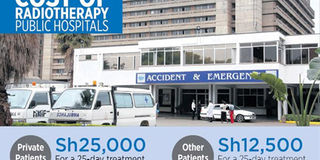Broken promise as cancer centres not yet set up in county hospitals

The Ministry of Health pledged in 2015 to install cancer machines for four hospitals, namely, Coast General Hospital (Mombasa), Moi Teaching and Referral Hospital (Eldoret), Kisumu General Hospital and Nyeri General Hospital at the cost of Sh1 billion each. As Kenya marks Cancer Day on February 4, 2016, that project is yet to materialise. PHOTO | JARED NYATAYA | NATION MEDIA GROUP
What you need to know:
This year’s national celebrations will be marked in Nyeri with First Lady Margaret Kenyatta as chief guest.
The four cancer machines that the Health Ministry had pledged to install by July last year will not be up and running until some time next year.
Cancer deaths rank third after infectious and cardiovascular illnesses as a leading cause of mortality.
Cancer claims 76 lives in Kenya every day, the Ministry of Health has said, highlighting the challenge facing the sector as the world marks Cancer Day on Thursday.
This year’s national celebrations will be marked in Nyeri with First Lady Margaret Kenyatta as chief guest.
In a speech read on his behalf ahead of the celebrations, the Cabinet Secretary for Health, Dr Cleopa Mailu, renewed the government’s commitment to ensure that diagnostic machines, including 21 magnetic resonance imaging equipment (MRIs) that were to be installed in county hospitals are installed.
However, the four cancer machines that the Health Ministry had pledged to install by July last year will not be up and running until some time next year.
Already, some patients are booked for chemotherapy treatment for 2017 because the available equipment at Kenyatta National Hospital and at the Moi University Referral Hospital are stretched beyond capacity.
The cancer centres that were to be set up at the Coast General Hospital (Mombasa), Moi Teaching and Referral Hospital (Eldoret), Kisumu General Hospital and Nyeri General Hospital would have cost Sh1 billion each.
The then Cabinet Secretary for Health, Mr James Macharia, said the centres “took a while to set up”.
Now, the new Principal Secretary for Health, Dr Nicholas Muraguri, has said that the Sh4 billion project is in “the feasibility stage to determine the scope and location”.
He told Nation on phone: “We are at the advanced stage of the Public Private Partnership and we expect the tendering process to begin in September and the ground-breaking in December.”
Cancer deaths rank third after infectious and cardiovascular illnesses as a leading cause of mortality.
A review of health data shows that the rate of death from cancer in Kenya is outpacing population growth and may double in the next 11 years. Cancer, like diabetes and heart disease, is a non-communicable disease, which means it cannot be spread from person to person.
PUBLIC HEALTH CRISIS
In a speech read on his behalf on Tuesday, Dr Mailu said cancer had become a public health crisis “that has a significant toll on the country’s economy”.
Kisumu senator Anyang’ Nyong’o said the government should create a “sin tax” to reduce the harm private companies added to the cancer burden in the country by taxing tobacco and alcohol more.
“The state should create limits to the harm that the private sector does to the people,” he said and proposed “taxes and regulations”.
Dr Joseph Kibachio, the head of the non-communicable diseases department in the Ministry of Health, said that there was need for the government and politicians to fight for “proper and responsible marketing” of the consumables such as cigarettes, fast foods and home products that predispose users to cancer.
Key prevention strategies have in the past targeted tobacco control, encouraging increased physical activity, promoting healthy diets and protection against exposure to environmental carcinogens.
Lack of adequate treatment facilities in the country leads over 10,000 cancer patients to travel overseas for specialised care where they spend over Sh11.28 billion on treatment.
Wednesday, Dr Muraguri said: “We know some of our private hospitals use just about 50 to 60 per cent of their cancer diagnosis and treatment machines. We intend to have more Kenyans access these facilities through the new National Health Insurance Fund rates.”
Meanwhile, a delegation of 11 Israeli healthcare companies is in the country to share “modern medical technologies” and possibly forge business partnerships with Kenyan hospitals.
They range from companies that offer testing and treating equipment for cancers, injuries, diabetes and high blood pressure diagnosis among others.
Acting Director of Medical Services Jack Kioko said talks between Kenyan hospital bosses and the Israeli delegation might help to address some of the challenges in the health sector.
“We are witnessing a reduction of communicable diseases such as HIV and Tuberculosis while non-communicable infections such as cancers and diabetes are on the rise. This meeting offers solutions that will benefit the counties,” he said.






